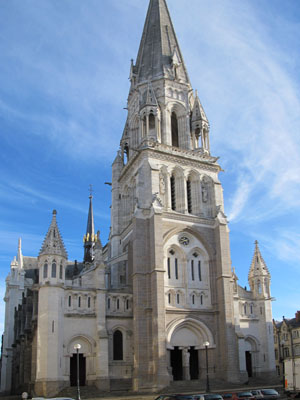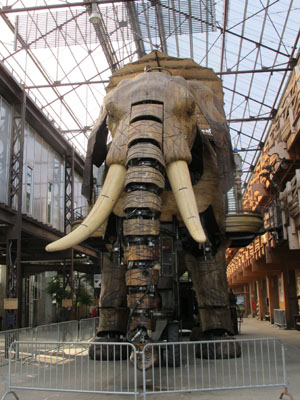| |
 |
 |
 |
| Comment on this report, or find other reports. |
 |
| Our Mystery Worshippers are volunteers who warm church pews for us around the world. If you'd like to become a Mystery Worshipper, start here. |
 |
| Find out how to reproduce this report in your church magazine or website. |
|
|
| 2306: Basilica
of St Nicholas, Nantes, France |
 |
 |
 |
Mystery
Worshipper: Augustine the Aleut.
The church:
Basilica of St Nicholas, Nantes, France.
Denomination:
Roman
Catholic, Diocese
of Nantes.
The building:
There have been Christians here since the third century, when
St Clair became the town’s first bishop. It replaces an 11th
century building and was restored between 1844 and 1869. It
was one of the first neo-Gothic churches in France and is now
an historic monument.
The church:
It is one of the three churches forming the parish
of Notre Dame, covering the core of the old city. Apparently
it is the focus of youth work in the city, particularly among
university students.
The neighbourhood:
The basilica sits in the north side of middle of the ancient
centre of Nantes, now tourist-infested and not that far from
the fortress of the Dukes of Brittany. There are plenty of cafés
and restaurants nearby.
The cast:
No names were available. There was a celebrant in his 80s, assisted
by another priest, likely in his 40s, and a slightly younger
deacon.
The date & time:
14 September 2011, 7.00pm.
What was the name of the service?
Parish Mass.
How full was the building?
Evening mass was in the chancel, between the mediæval high altar
and a modern altar at the far end of the chancel, with the congregation
facing west toward the main body of the church. As the chancel
had seating (including canons’ stalls) for under a hundred,
the 58 men and 44 women filled all the seats and over a dozen
were left standing, perched on the steps of the high altar,
and leaning against pillars.
Did anyone welcome you personally?
I was among the first; as others arrived, a polite nod with
eye contact was common, which is more than I expected in a major
church of a major city.
Was your pew comfortable?
I had taken a seat in one of the canons’ stalls, and was pushed
into the far end of the range of seats as the place filled up.
I had chosen it for the padded seat as I knew that collegiate
church clergy have a tendency of somehow finding comfort.
How would you describe the pre-service
atmosphere?
Quiet, but with low-key noises as others arrived, and shuffling as the seats filled out.
What were the exact opening words of the
service?
Au nom du Père, du Fils, et du Saint-Esprit.
What books did the congregation use during the
service?
Nobody seemed to have any service books with them. We all followed from memory, or not at all.
What musical instruments were played?
This was an evening service, and there was no music at all.
Did anything distract
you?
I was struck by the silent intensity of the congregation. None
of them, myself excepted, seem to be casual attendees. We had
a remarkable tableau of young men and women of all origins,
several kneeling on the hard marble by the high altar, motorcycle
helmets assembled into a small pyramid, satchels of school books
and laptops at their feet.

Was the worship stiff-upper-lip,
happy clappy, or what?
This was an evening mass without music, but the intensity of
congregants’ devoutness took me aback. Nobody was dozing at
this one, and there was an air of people preparing themselves
for a mission of one sort or the other. The celebrant, flanked
by the other two clerics, took a position at the north end of
the altar for the readings and opening prayers, then at the
offertory moved to say those prayers with his back to the people.
For the consecration, he moved around the altar to face the
congregation. This struck me as a novel way of addressing the
ad orientem/versus populum debate while paying an unconscious
tribute to the north-end preference. When the deacon led the
intercessions, he held his stole in the same way that a Byzantine
deacon holds his orarion. The peace was passed with courtesy
and quiet intensity – a parishioner clasped me by the arm
when he shook my hand, and somehow it did not seem to be an
invasion of my space. Another parishioner, a young woman with
a student’s backpack, shook my hand and told me that I was very
welcome at the assembly.
Exactly how long was the
sermon?
10 minutes.
On a scale of 1-10, how good was the preacher?
9 – The priest's pronunciation and diction were clear (a
point I like to make, as clergy sometimes forget that not all
in attendance are native-speakers of their language).
In a nutshell, what was the sermon
about?
He spoke of how, when he first came to Brittany and biked about
the back roads, he noticed the many roadside crosses that had
been erected by devout farmers, and how they were always built
so that the passer-by had to look up to the skies. As a cyclist,
he was at first slightly annoyed, but came to be grateful that
his attention was diverted from the road and its obstacles,
even if only for a minute. Christ was lifted up for us, so that
we could be lifted from our burdens, taste the heavens, and
return to our mission each day strengthened and renewed.
Which part of the service was like being in
heaven?
The intensity of the devotion of almost everyone in the congregation.
Nantes and the Vendée were sources of missionary endeavour for
centuries and I had a feeling that this had not entirely died
out. It was clear that this was not a social club.
And which part was like being in... er... the other place?
Nothing in particular.
What happened when you hung around after the service looking lost?
Everyone instantaneously disappeared, either down the steps
to the nave or through the side doors. The clergy snappily processed
out to the sacristy and I was soon left by myself. I took a
picture or two of the tomb of King Francis II, and then left
to enjoy a bit of eel in garlic in a nearby restaurant.
How would you describe the after-service
coffee?
There was none, so eels in garlic and a bottle of red wine substituted.
The next day, I saw the woman student in a crowd of gaudily-costumed
medical students circling the main square and chanting to celebrate
their return to class, and we exchanged smiles. Later that afternoon,
I took a ride in the mechanical elephant at the old shipyards,
and saw one of the other worshippers working at a couscous kiosk,
and he gave me a quick nod of recognition. Even at a quarter
of a million, Nantes seemed to be a small place.
How would you feel about making this church your regular (where 10 = ecstatic, 0 = terminal)?
10 – This was an interesting group of people in the chancel, and I might well go back.
Did the service make you
feel glad to be a Christian?
As a traveller, I had not expected to notice the depth of life
in a congregation so quickly, and felt strengthened by it.

What one thing will you
remember about all this in seven days' time?
The tableau of young people crowded about the altar, attentive
to every word and action; and a strong sense of welcome, not
because they were trying to recruit me but because that’s what
they are.
More Camino reports |
|
|
 |
 |
 |
| We rely on voluntary donations to stay online. If you're a regular visitor to Ship of Fools, please consider supporting us. |
 |
 |
 |
| The Mystery Pilgrim |
 |
| One of our most seasoned reporters makes the Camino pilgrimage to Santiago de Compostela in Spain. Read here. |
 |
 |
 |
| London churches |
 |
| Read reports from 70 London churches, visited by a small army of Mystery Worshippers on one single Sunday. Read here. |
| |
|
|
|
|


